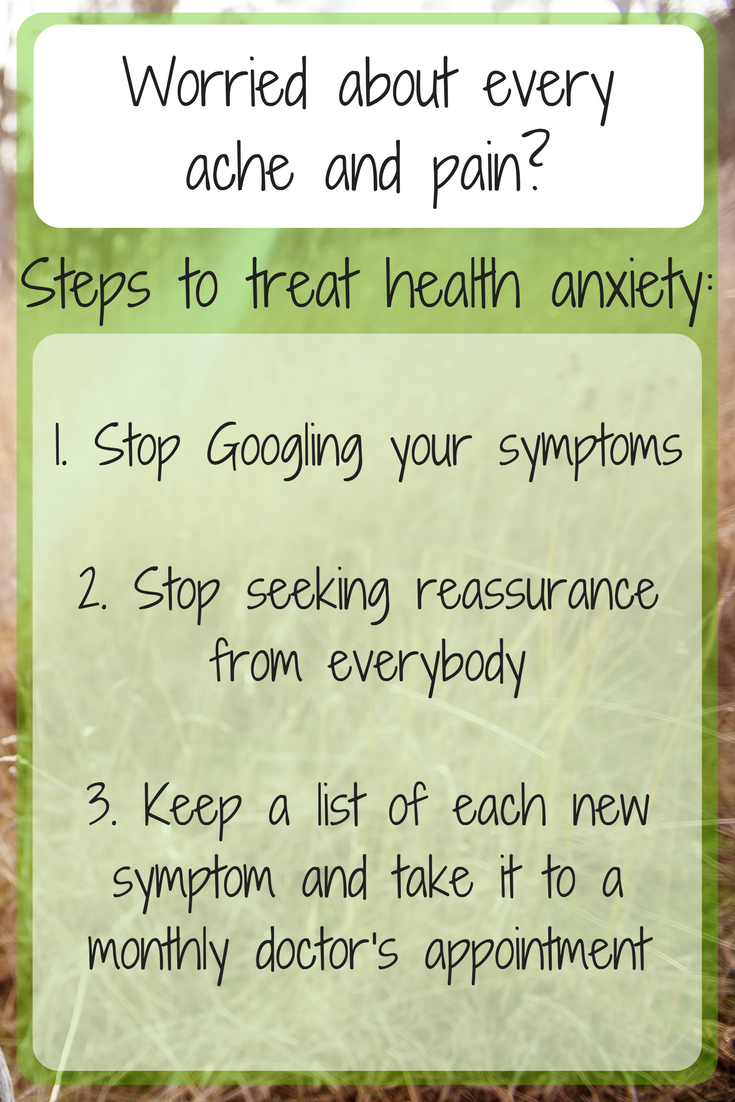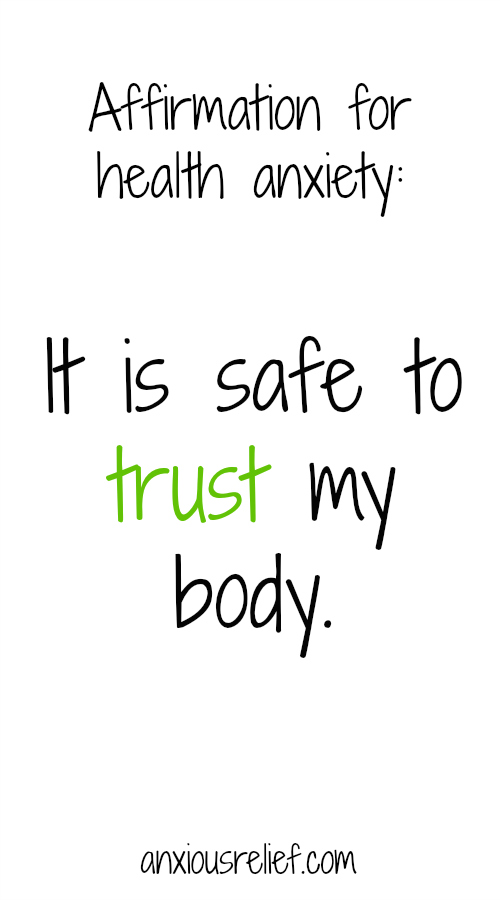If every twinge and niggle is making you anxious, and you’re worried about every ache and pain, you are not alone. This article will show what you can do to ease your stress.
Health anxiety, where you are worried about every ache and pain, is very, very close to my heart. I experience health anxiety from time to time. I’m not ashamed of it: the biggest lesson I’ve learnt is that knowing how to forgive myself is key.
Big life events can impact health anxiety – I needed to be extra mindful of ways to relieve anxiety while I was pregnant, and also during numerous health scares.
Related: Grounding meditation
Watch the video or continue reading below…
What is health anxiety and why does it make you worried about every ache and pain?
Health anxiety is basically an overblown reaction to symptoms and what it means is you interpret the symptoms in a catastrophic way.
You become worried about every ache and pain.
So, say you find a lump somewhere, the first immediate thing that comes to your mind is that lump must be the big C when in fact, there are so many other reasons for having lumps and bumps in your body and in fact, the older you get, the more lumps and bumps you’re going to get.
They’re a fact of life.
But when you have health anxiety, this causes you to look at every symptom as if it’s a potential threat to you and you just have this overblown reaction.
I know when my health anxiety is at its worst, I’m absolutely convinced that I’m going to die and I’m worried about every ache and pain.
That’s the reality of it when you have health anxiety, that is what you live with a lot of the time.
I just want to examine why this happens and to share with you some energy healing tips, they’re common sense tips but they do relate to energy healing as well.
This has definitely worked for me in helping me overcome my own health anxiety.
Before I go into it, I’ll just explain to you my story with health anxiety and why I experience it.
Back in 2003, I started experiencing numbness and tingling in my body and I remember I was in a plane flying from Sydney to Perth when I got this little twitch and numbness in my face and it felt like my entire right hand side went numb.
And I went to my GP and he said, “Well, I think you might have multiple sclerosis or MS.”
Back in those days, they didn’t have the treatments available these days that help people with multiple sclerosis. It really was quite a catastrophic thing and a traumatic thing for me to hear at that age.
So, I was going through investigations and tests and a huge amount of anxiety.
That was also around the time that I met the Archangel Michael.
It was around the time I started seeing auras as well but there was also this trauma of being told that I might possibly have multiple sclerosis.
Turns out I didn’t and I don’t.
It was just anxiety manifesting in this numbness and tingling.
But that trauma, to this day, means that every time I have to go see my GP about something, I worry that they might tell me something really catastrophic and really bad.
So that’s the fear for me.
The fear for me is hearing that that catastrophic type of diagnosis and what that would possibly mean.
My mind races with, “What would my kids do if I died? What would that mean for them growing up without a mother?” All those sorts of things, they just flood my head all at once and they all crash into each other and it’s really, really horrible.
But I have done some things that have helped me calm my health anxiety, be a little bit more realistic about symptoms when I experience them because the symptoms don’t go away.
We all have little things that we need to go see the doctor about, things that need further investigation and if you’re sensible about life, you don’t just stop going to the doctor. That’s not realistic at all.
It’s just about reframing so that you’re not seeing your symptoms as catastrophically and there’s a three-step process for how to do that.

Step 1: Google is NOT your friend when you’re worried about every ache and pain
This is the golden rule always when you have health anxiety: Do not Google your symptoms.
Google is not your friend!
Google does not have a medical degree and Google does not have your best interest at heart when it comes to telling you what symptoms might mean.
When you go to your doctor and you have a collection of symptoms, they use those symptoms and they use their own interpretation and their own knowledge and their own background of your medical record to tell you what it is most likely to be, what you’re most likely experiencing.
And then they might refer you for more tests, they might send you for more investigations but the doctor will use their knowledge.
Google is an aggregator that goes out and seeks everything on the internet and brings back results.
So if you Google “heart palpitations,” and a list comes up and on that list, you’ll see “heart palpitations anxiety” or you might see “heart palpitations heart attack.”
Which one are you going to click on?
Of course, you’re going to click on heart attack because that’s what your brain registers as a threat.
And as an anxious woman, you’re going to investigate that threat because you want to tell yourself and calm yourself and say to yourself, “No, that’s not a threat anymore. I investigated that. That’s not a threat, that doesn’t apply to me.”
9 times out of 10, clicking on that link will only make you more anxious and alarmed because you won’t be able to discount the threat.
Instead, your anxiety will escalate.
So, I’ve got one blanket solution for that: do not Google your symptoms.
And you might say to me, “Well, how do I research what my symptoms might be?”
Go and see your doctor. But don’t go and see your doctor every single time something new crops up. In step three below, I will tell you how and when you should go and see your doctor.
Step 2: Stop seeking immediate reassurance all the time
Most of the time, with most symptoms, you don’t need to react on them right away.
Give it a couple of weeks just to see if this symptom calms down or not before going and seeking medical attention.
But of course, people with health anxiety who are worried about every ache and pain don’t only seek medical attention from a qualified medical professional.
They try and seek it from their family and their friends and a lot of the time, this can lead to a person with health anxiety sort of coming across as a hypochondriac, I hate that term, but people have called me a hypochondriac in my time and I think it’s just a reflection as to how toxic and annoying it can actually become when you’re constantly seeking reassurance for symptoms that are most likely to be benign.
The other thing with stopping seeking immediate reassurance is, energetically, this brings in space.
Space around the symptom, space around the emotion, space around the issue.
And energetically, white light and space is what heals, that’s the healing energy.
I have a free Space between your brain cells meditation that you can listen to and it will guide you through a guided meditation to how you can actually bring space between your brain cells, but space between any cells, space between any part of your body to just give you that room that you need yourself and the emotion of the symptom, that catastrophic interpretation that you’re experiencing.
Step 3: Keep a list of your symptoms and make a monthly appointment with your doctor
Now, I said earlier I would tell you when and how to go and see the doctor.
This is my recommendation if you’re experiencing lots of worrying symptoms, they seem to happen fairly regularly and you want to break that habit of being constantly in the doctor’s office:
When you get symptom, write it down on a piece of paper and write down the date when you first noticed this symptom.
Then give it a month and see if that symptom is still bothering you.
If the symptom is still there after a month, yeah, by all means, go and see your doctor.
And in fact, a lot of the time, it’s recommended that if you experience health anxiety and you do need that medical attention, that you make a monthly appointment with your doctor and take your list so you can show them what you’re experiencing.
It’s also helpful to cross the symptoms off your list within the month if they resolve:
“Yeah, that bump’s not there anymore…cross that off.” “Yeah, headaches are gone…cross that off.” And anything else that remains, the doctor then uses their knowledge…remember, they are highly educated people, they know what they’re talking about, to recommend whether something needs more investigation or not.
Sometimes it will, sometimes it won’t.
Please learn to trust your doctor, learn to trust their opinion.
There are times that doctors do make mistakes but by far and large, they don’t.
Remember, most of the time, you’ll be the rule. You won’t be the exception. Those exceptions are exceedingly rare, so rare. That’s why those exceptions make it into the media because they are so incredibly rare. Most of the time, doctors do a fantastic job and they get it right.

Number one, Google is not your friend. Get off Google.
Number two, stop seeking immediate reassurance from your family and friends. They don’t want to hear about you harping about it all the time and it’s also no good for you to be constantly seeking this reassurance. Giving it some space between you and the symptom, as uncomfortable as it might feel is really important towards breaking this habit of health anxiety.
Number three, write a list of every symptoms as it comes, write the date next to it and make monthly appointment with your doctor until your health anxiety settles.
And remember to listen to my Space between your brain cells meditation – it will really help you.
Love + light,
Eva xo